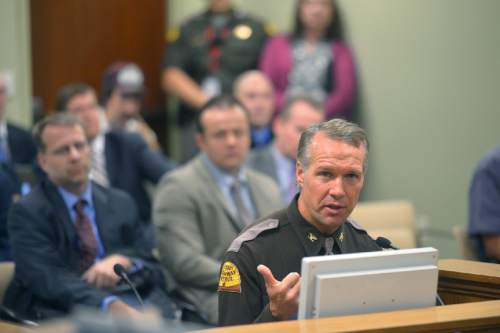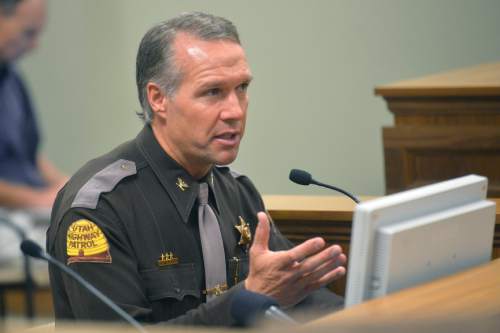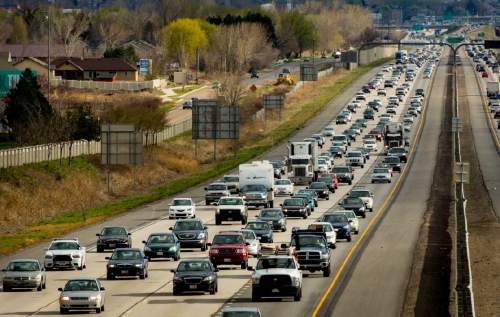This is an archived article that was published on sltrib.com in 2014, and information in the article may be outdated. It is provided only for personal research purposes and may not be reprinted.
The Utah Highway Patrol is warning that it will much more strictly enforce speed limits when they rise soon from 65 to 70 mph on urban interstate freeways.
Col. Danny Fuhr, superintendent of the Highway Patrol, acknowledges that troopers now give a buffer of about 5 mph over the speed limit before they will issue tickets. But expect a buffer of only 1-3 mph when the speed limit rises.
"We're trying to send a message that when the speed limit increases by 5 mph, we're not going to change our enforcement practices to increase [the buffer] by 5 mph," he said Tuesday.
Fuhr said under the current 65 mph speed limit, drivers would need to travel about 75 mph before troopers would ticket them. Once the limit rises to 70 mph, traveling 75 mph will still bring a ticket.
"I would be lying if I told you the Utah Highway Patrol enforces between 65 and 70 mph on the Wasatch Front. We just haven't because there are people going much faster than that, which we focus on," Fuhr said.
"People who are traveling 75 mph today are catching our attention. When the speed limit changes to 70 mph, those same people will still be catching our attention," he said.
He also said that people doing 1-3 mph over the speed limit likely would not be ticketed.
"They're not going to be given citations for things like that," Fuhr said. "It may be that they weren't paying attention for a moment. We give people the benefit of the doubt for that."
Fuhr said the Highway Patrol reacted similarly when the speed limit was raised from 75 to 80 on some rural freeway stretches.
"In the 80 zones, there were a lot of people who asked why they got a ticket at 85," figuring they had a 5-mph buffer, he said.
"We're very strict in those areas. Eighty-five is very fast to be driving. So we say in an 80 [mph] zone, 80 is 80. And 5 mph over in an 80 zone is problematic. So you're going to get pulled over if you do 85 in an 80 zone," he said.
Fuhr said his agency's concern that drivers might figure they have a 5-mph buffer in the new 70-mph zones in urban areas is "why we reacted so strongly Friday," when the patrol initially said it opposed raising the limit as those plans were announced by the Utah Department of Transportation.
On Monday, the patrol backed off, and said it realized a new law, HB80, gave UDOT the responsibility to do speed studies and use engineering reviews to decide where it would be safe to raise freeway speed limits. It said it is UDOT's job to set the limit, and the Highway Patrol's job to enforce them.
Jason Davis, UDOT's chief of operations, said his agency found in studies of speed that most drivers already are traveling faster than 70 mph on urban freeways.
"We're not changing the speed of the driver. We're changing the posted speed limit," Davis said. "We're just bringing the speed limit into compliance with what [motorists] are already doing."
Fuhr said Tuesday, "If everybody were to go 70 mph on the first day that UDOT posts those signs, the agency would be thrilled." He just doesn't want people believing that driving 75 would be OK.
"So we're actually hoping that the studies are correct, that driving behavior won't change. But that's really up to us as the Highway Patrol to ensure that" through strict enforcement.
Fuhr also reminds motorists that driving 70 mph may not be safe in inclement weather — and said such behavior contributes to more than 20 Highway Patrol troopers being hit every year, including three last week in a minor snowstorm.
"We go to slide-off crashes, and people will say, 'Well [the speed limit] was 70 mph, and I was doing 70,' " he said. "We just kind of shake our heads. People need to know they can drive below the posted speed limit in those kind of conditions."
Fuhr added, "Too often, our troopers are driving appropriately for the weather, and they are passed by nine out of 10 cars."
Fuhr said the Highway Patrol is planning strict speed limit enforcement to improve safety, not to increase revenues.
"We don't make any revenue from our citations, and never have. So for us, it's about changing driver behavior so they can get home safely," Fuhr said.
He adds that of the 250,000 citations the Highway Patrol issues annually, half are merely warnings.
UDOT currently is taking comment from cities and counties about the proposal to raise the speed limit on urban freeways. It says it expects the change to occur in mid-to-late December.







